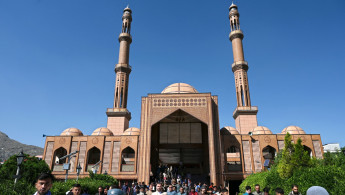Afghans mark Eid as ceasefire pauses deadly violence
A three-day ceasefire agreed by the warring Taliban and Afghan government came into force on Thursday as the country celebrated Eid al-Fitr, after weeks of intense clashes.
Proposed by the militants and matched by President Ashraf Ghani, the truce will grant respite for Afghans as they mark the Muslim festival with friends and family.
Violence has intensified in the country since the United States missed a May 1 deadline, agreed with the Taliban last year, to withdraw all of its troops.
If the ceasefire holds, it will be only the fourth pause in fighting in nearly 20 years of conflict.
Early on Thursday, Afghan men, women and children around the country flocked to neighbourhood mosques or gathered in open grounds to offer morning prayers at the start of Eid festivities that would last until Saturday.
Authorities deployed security personnel to several prominent mosques in the capital Kabul who frisked worshippers as they arrived for morning prayers.
"We want a permanent ceasefire. That will make us happier, as many more lives will be saved," said Amir Jan Sulaimankhil, a resident from Nangarhar province.
Ghani used his annual Eid address to urge the Taliban to agree to a lasting truce now international troops are leaving the country.
"We don't want you to surrender, but we want you to accept a political solution. War is not a solution," he said.
Tens of thousands of Afghans have been killed and millions have been displaced by the nearly two-decade-old conflict, which has seen a resurgent Taliban take hold of large swathes of the country.
The militants and the Afghan government launched peace talks in September last year, but progress has stalled despite international efforts to jump-start the negotiations.
|
Ceasefires in the past have largely held, in what is widely
thought to be an exercise by the Taliban leadership to prove it has firm control over the myriad factions across the country that make up the hardline movement.
"He (Taliban chief Hibatullah Akhundzada) wants to show that he is the owner of the war and peace," said Afghan political analyst Fawad Kochai, based in Kabul.
There were no immediate reports of any violation of the ceasefire.
'No plans to go anywhere'
Washington and NATO have pledged to withdraw their troops by September 11, leaving Afghan forces to defend themselves and protect the vulnerable population.
While the militants have avoided engaging American troops, they have stepped up attacks against Afghan government forces.
Violence has rocked several provinces in recent weeks, and on Tuesday the insurgents seized a district not far from the capital.
A series of blasts outside a girls' school in the capital on Saturday killed more than 50 people, mostly teenage girls.
Officials blamed the Taliban, who denied they were involved.
The United Nations Assistance Mission in Afghanistan (UNAMA) said it would continue to support Afghanistan.
"Let me assure you that we have no plans to go anywhere. We intend to stay the course and work with all of you," said head of UNAMA Deborah Lyons in a statement to mark Eid.





 Follow the Middle East's top stories in English at The New Arab on Google News
Follow the Middle East's top stories in English at The New Arab on Google News
![The UAE is widely suspected of arming the RSF militia [Getty]](/sites/default/files/styles/image_330x185/public/2024-11/GettyImages-472529908.jpg?h=69f2b9d0&itok=Yauw3YTG)
![Netanyahu furiously denounced the ICC [Getty]](/sites/default/files/styles/image_330x185/public/2024-11/GettyImages-2169352575.jpg?h=199d8c1f&itok=-vRiruf5)
![Both Hamas and the Palestinian Authority welcomed the ICC arrest warrants [Getty]](/sites/default/files/styles/image_330x185/public/2024-11/GettyImages-2178351173.jpg?h=199d8c1f&itok=TV858iVg)